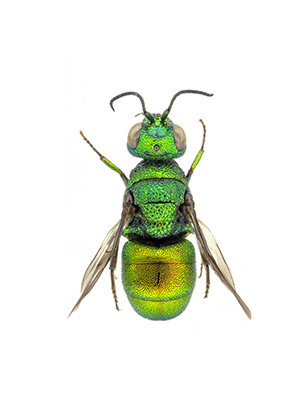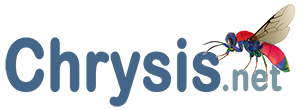Last updated on November 28th, 2023
 From: Kimsey L.S. & Bohart R.M., 1990 (1991) – The chrysidid wasps of the world. Oxford University Press, ix-652 pp.
From: Kimsey L.S. & Bohart R.M., 1990 (1991) – The chrysidid wasps of the world. Oxford University Press, ix-652 pp.
Synonymy
Holopyga Dahlbom 1845:4. Type: Holopyga amoenula Dahlbom 1845:4. Desig. by Ashmead 1902:227.
Halopyga Tournier 1878:305. Invalid emendation of Holopyga Dahlbom 1845.
Pseudhedychrum Abeille 1879:27. Type: Chrysis fervida Fabricius 1781:456. Desig. by Bodenstein 1939: 130.
Oar Semenov 1954b:142. Type: Oar globulus Semenov 1954b:144. Orig. desig. and monobasic.
Psacas Semenov 1954b:l43. Type: Psacas meda Semenov 1954:143. Otig. desig. and monobasic.
Generic diagnosis
Facial setae sparse and erect; scapal basin deep and transversely cross-ridged; vertex with inter-ocellar sulcus; malar space less than 1 MOD; genal carina present; pronotum with anteromedial pit; mesopleuron strongly angulate, with well- developed verticaulus, omaulus, signum, and scrobal carina; notauli sulciform; scutellar wing fossa without anterior lobe; fore femur usually angulate sub-basally with ventral carina; hind tarsal claw with 2-5 (rarely 1) subsidiary teeth; fore wing medial vein strongly arched, arising at or slightly before cu-a, costa dilated medially, stigma short and broad, Rl clearly indicated; T-III apical margin evenly rounded or somewhat indented medially, slightly swollen subapically; male genitalia, volsella with digitus and cuspis.
Hosts
Holopyga is another large genus whose biology is poorly known, probably because these chrysidids attack ground-nesting sphecid wasps. In North America Bicyrtes quadrifasciata (Say) and B. fodiens (Handlirsch) have been reported as hosts of ventralis (Evans 1966). Astata pinguis Dahlbom is a host of integrum in Europe according to Else (1973). Móczár (1967) and Linsenmaier (1959) reported Chalicodoma sp. (Megachilidae) as the host of ovata. Mocsáry (1889) listed Chalicodoma muraria F. as the host of amoenula, Cerceris quadrifasciata Panzer and Mimumua (Vanderl.) as hosts of ignicollis, and rugosa on Sceliphron madraspatanum (F.) (as Pelopoeus separatus Sm.).
Distribution
Species occur in all zoogeographic regions, with the majority in the Palearctic. There are 67 Palearctic species, 8 Nearctic, 7 Neotropical, 3 Asian, 1 in Australia, 1 in Madagascar, and 4 in Africa south of the Sahara.
Discussion
Holopyga are generally large heavy-bodied wasps, ranging in length from 4-8 mm. They can be distinguished by the sharply angulate fore wing medial vein, setose medial cell, multidentate tarsal claws, carinate and angulate mesopleuron, angulate postocular region, and cross-ridged scapal basin.
A number of Palearctic species are sexually dimorphic, particularly amoenula and fervida, which are two of the most commonly collected species. In these species males tend to be blue and green, at least on the thorax, and females coppery red.
The name gloriosa F. has been used for years for one of the commonest European species, amoenula. Surprisingly, upon examining the type, we discovered that gloriosa is actually a synonym of Pseudomalus auratus and not a species of Holopyga (Kimsey 1988b).
Linsenmaier (1987) described the genus Chamaeholopyga based on the new species parvicornis Linsenmaier (1987). We have been unable to see this species and therefore cannot render judgment on the placement of this group.
European species
- Holopyga amoenula Dahlbom, 1845
- Holopyga amoenula occidenta Linsenmaier, 1959
- Holopyga amoenula oriensa Linsenmaier, 1959
- Holopyga austrialis Linsenmaier, 1959
- Holopyga baeckmanni Semenov, 1967
- Holopyga chrysonota (Förster, 1853)
- Holopyga chrysonota appliata Linsenmaier, 1959
- Holopyga chrysonota discolor Linsenmaier, 1959
- Holopyga comosa Semenov & Nikolskaya, 1954
- Holopyga crassepuncta effrenata Linsenmaier, 1959
- Holopyga cypruscola Linsenmaier, 1959
- Holopyga duplicata Linsenmaier, 1987
- Holopyga fervida (Fabricius, 1781)
- Holopyga generosa (Förster, 1853)
- Holopyga generosa proviridis Linsenmaier, 1959
- Holopyga generosa virideaurata Linsenmaier, 1951
- Holopyga gloriosa-aureomaculata complex
- Holopyga gogorzae Trautmann, 1926
- Holopyga guadarrama Linsenmaier, 1987
- Holopyga hortobagyensis Móczár, 1983
- Holopyga ignicollis Dahlbom, 1854
- Holopyga ignicollis granadana Linsenmaier, 1968
- Holopyga ignicollis padri Linsenmaier, 1968
- Holopyga impressopunctata Arens, 2004
- Holopyga inflammata (Förster, 1853)
- Holopyga inflammata caucasica Mocsáry, 1889
- Holopyga jurinei Chevrier, 1862
- Holopyga lucida Lepeletier, 1806
- Holopyga mauritanica (Lucas, 1849)
- Holopyga mavromoustakisi Enslin, 1939
- Holopyga merceti Kimsey, 1990
- Holopyga metallica (Dahlbom, 1845)
- Holopyga minuma Linsenmaier, 1959
- Holopyga miranda Abeille de Perrin, 1878
- Holopyga mlokosiewitzi spartana Linsenmaier, 1968
- Holopyga parvicornis Linsenmaier, 1987
- Holopyga pseudovata Linsenmaier, 1987
- Holopyga punctatissima Dahlbom, 1854
- Holopyga punctatissima reducta Linsenmaier, 1959
- Holopyga rubra Linsenmaier, 1999
- Holopyga sardoa Invrea, 1952
- Holopyga trapeziphora Linsenmaier, 1987
- Holopyga vigora Linsenmaier, 1959
- Holopyga vigoroidea Arens, 2004
Copyright, Authorship, and Ownership statements
All text and images of this page are copyright ©️ Chrysis.net unless otherwise stated - please see individual cases for authorship and copyright details. The specimens pictured are from the authors' or other collaborators' personal collections and from the collections of various museums. Unless otherwise specified, the whole content of this web site is for personal, non-commercial, scientific, and educational purposes given proper accreditation to the page from which they were derived are provided, and under Chrysis.net Terms and Conditions.
For citation purposes
Agnoli G.L. & Rosa P. (2025) Genus Holopyga Dahlbom, 1845, in: Chrysis.net website. Interim version 22 April 2025, URL: https://www.chrysis.net/database/genus-holopyga/.




